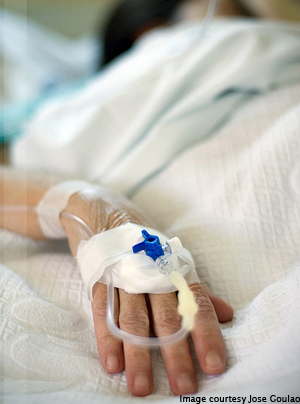Prediction of a better future for head-injured patients
Posted on 6 October 2011
Prediction of a better future for head-injured patients
 Predictive algorithms could improve the survival rate of patients who have suffered head injuries. Laura Moss, one of our Agents, describes the Avert-IT project.
Predictive algorithms could improve the survival rate of patients who have suffered head injuries. Laura Moss, one of our Agents, describes the Avert-IT project.
The use of sophisticated machine learning algorithms is set to transform the treatment of critically ill head-injured patients. The Avert-IT project is an EU-funded collaboration which will construct an early warning alarm system to notify clinicians of impending low blood pressure (hypotension) in patients with head injuries. The HypoPredict system is based on a predictive model developed using patient data collected from numerous hospitals located across Europe. Clinical trials are currently being planned but early evaluation results indicate that the HypoPredict system represents a major advancement in the treatment of head-injured patients.
Severe traumatic brain injury is a leading cause of death, and those who survive the trauma often have serious and long term health problems. One particular impact on the patient's long-term outcome is the effect of abnormally low blood pressure, known as hypotension, on the patient's organs. It is particularly harmful to leave hypotension untreated in unconscious head-injured patients, because unconscious patients have difficulties regulating blood flow to their brain. Current patient-monitoring equipment can alert a clinician when a patient's blood pressure drops too low. However, by this point, damage may already be occurring. To try and counteract the damage, a patient is given powerful and sometimes invasive treatment to raise the blood pressure and to repair (if possible) any damage to organs.
Clearly, it is highly desirable to identify if a patient is going to suffer from low blood pressure before it occurs. To investigate likely patterns of physiological measurements (e.g. heart rate) which arise before a hypotensive event, the Avert-IT project has collected patient data from a number of neuro-intensive care units located across Europe, including, Sweden, Italy, Germany, and Spain. Data is collected automatically using technology from Grid computing. This technology enables each neuro-intensive care unit to push anonymous patient data to a central repository at the University of Glasgow's National eScience Centre. Avert-IT researchers have then used machine learning software to analyse this vast storage of patient data to automatically learn a Bayesian neural network (a mathematical model) which can be used for the prediction of hypotension in future patients. The novel Bayesian neural network (BANN) represents the relevant patient variables and their conditional probabilities in the period before a patient suffers from hypotension. Early evaluations of the accuracy of the BANN to predict hypotensive events are very promising.
Once the BANN has been finalised, the clinical output of this research will be the installation of the HypoPredict decision support tool in neuro-intensive care units. HypoPredict will implement the novel BANN and use a patient's demographic information (e.g. age) and continually collected physiological parameters to output a continuous Hypotension Prediction Index (HPi). The HPi will provide clinicians with a guide of how likely it is that a patient is about to suffer from a damaging period of low blood pressure. The score will be continuously updated to reflect changes in a patient's condition. Researchers hope that once this tool is implemented in neuro-intensive care units it will lead to early interventions to avoid low blood pressure, thereby vastly improving patient outcomes and leading to significant financial savings for the healthcare provider, estimated to be around €1600 per patient per day.

